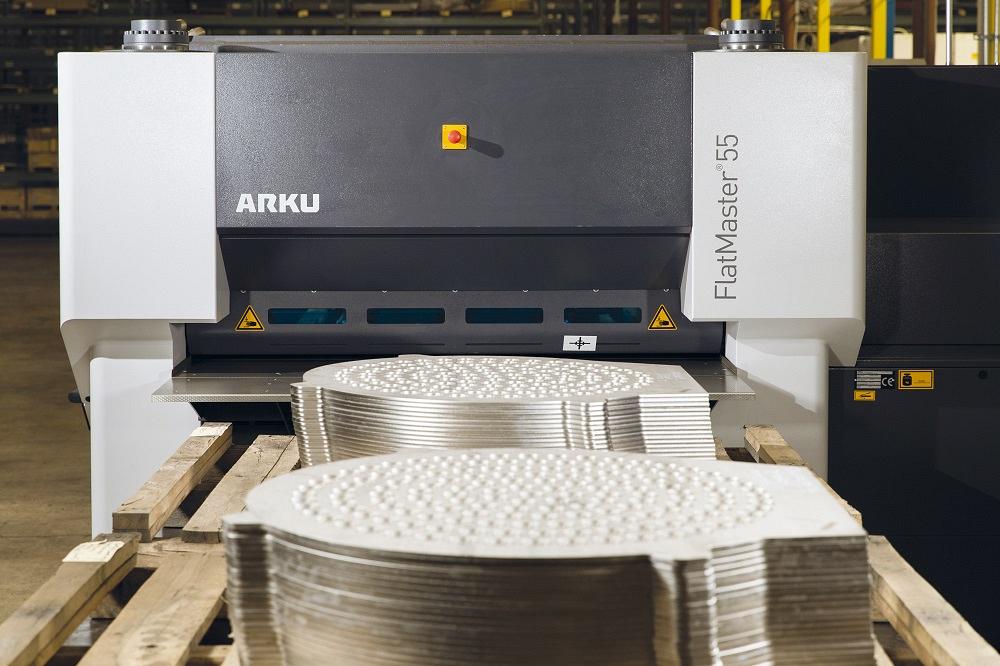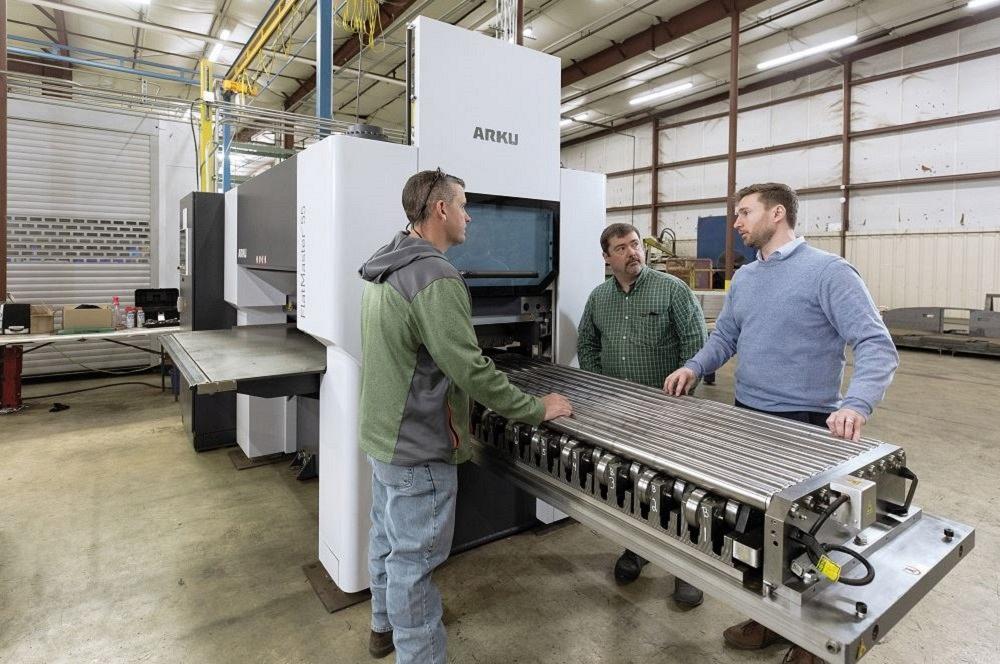- FMA
- The Fabricator
- FABTECH
- Canadian Metalworking
Categories
- Additive Manufacturing
- Aluminum Welding
- Arc Welding
- Assembly and Joining
- Automation and Robotics
- Bending and Forming
- Consumables
- Cutting and Weld Prep
- Electric Vehicles
- En Español
- Finishing
- Hydroforming
- Laser Cutting
- Laser Welding
- Machining
- Manufacturing Software
- Materials Handling
- Metals/Materials
- Oxyfuel Cutting
- Plasma Cutting
- Power Tools
- Punching and Other Holemaking
- Roll Forming
- Safety
- Sawing
- Shearing
- Shop Management
- Testing and Measuring
- Tube and Pipe Fabrication
- Tube and Pipe Production
- Waterjet Cutting
Industry Directory
Webcasts
Podcasts
FAB 40
Advertise
Subscribe
Account Login
Search
Leveler offers quick ROI, opens new markets for custom fabricator
- April 1, 2022
- News Release
- Shop Management

EMS runs all its parts through the leveler for the stress-relieving benefit, not just the parts with visible flatness defects.
Situation
Engineered Mechanical Systems (EMS), Chattanooga, Tenn., is a one-stop shop for custom fabrication projects, processing materials from aluminum to steel in all shapes and sizes and on a large scale—up to 20 tons of parts a day.
Companies in the food, power/energy, and automotive industries have found success in Chattanooga, with its strategic location that allows one-day shipping to nearly a third of the U.S. consumer market, so it’s no coincidence that EMS’s initial customers hailed from these industries.
In 1990, before founding EMS, CEO Mark Fairchild noticed that metal manufacturers from the food industry were in urgent need of rapidly shipped, high-quality equipment. Pursuing a hands-on approach, he soon opened a shop with his first customers already on the books. Over the years, the customer base grew as EMS entered new markets like aerospace, energy, and agriculture. As a result, EMS became less dependent on one sector and broadened its portfolio, expanding its shop to the current 120,000 sq. ft. with 95 workers.
As the company’s size increased, customer expectations grew to match. “Customers were getting more and more price-sensitive,” recalled Chris Smith, vice president of manufacturing. “It was clear to us that the leveling process offered big potential to increase efficiency.”
Leveling parts was a constant and urgently needed job at EMS, since the heat from the laser cutting process often caused deformations. In addition, more and more customers began using welding robots that required consistently flat, stress-relieved pieces.
EMS initially used a press brake and power rolls to bring deformed parts and sheets back into shape. However, the machine increasingly became a burden. First, there was a significant amount of scrap because it couldn’t straighten parts with major deformations. Second, even when parts were suitable for straightening, it often delivered poor quality, which made time-consuming rework necessary.
“Productivity is key for us,” Smith said. “We produce 3,000 parts per week. Any delay can quickly lead to a huge backlog.”
With its press brake keeping three workers busy nearly full-time, EMS realized it was time for an upgrade.
Resolution
A customer told EMS about ARKU leveling equipment. “We visited ARKU at their leveling center in Cincinnati in early 2018,” Smith said. “After we were shown the FlatMaster 55, it was a no-brainer to purchase it.” With its compact design, the machine was a good fit for the limited space on EMS’s shop floor, and its roller pickup feature would allow for easy cleaning of the leveling and backup rollers to help eliminate downtime.
After delivery, it took only a week to get the machine up and running. An ARKU technician managed the technical setup on-site and trained the operators. They were excited about the leveler’s ease of use: An intuitive touchpad and preinstalled parameters ensure smooth operations. EMS management also got trained on the machine to spread the technical knowledge across the company.

(From left) Chris Dowden, EMS director of sales; Chris Smith, EMS VP of manufacturing; and Nicholas Miller, ARKU president, discuss how crucial and easy the leveler’s roller pickup feature is.
Since the machine was installed in early 2019, leveling has gone from being a bottleneck to an accelerator. When laser cutting the parts, workers no longer have to worry about minimizing deformations, because the leveler will take care of any parts with imperfections.
“The leveler has taken our whole production to a new level. We now run all our parts through the machine for the stress-relieving benefit, not just parts with visible flatness defects. This in return ensures the best-possible-quality final products, as well as efficient downstream processing,” Smith explained.
In addition, scrap is no longer an issue. The FlatMaster 55 can level even the trickiest parts. Consequently, EMS has been able to cut production costs by 15%. “This pays off, especially in times with rising raw material prices,” Smith said. “The price we paid for the leveler was outweighed by the money we saved on scrap, which was about three months.”
Before the purchase, Smith assumed the shop would have the leveler running about five hours per day; it’s turned out to be more than 10 hours instead. And only one worker is needed to operate the machine, freeing up capacities for other tasks on the shop floor.
Not only has the leveler enhanced existing processes, it’s also opened up new business opportunities. It didn’t take long for word-of-mouth to spread about the company’s new capabilities. “One year after installation, new customers came to ask if we could level parts for them. This encouraged us to make a new business segment in the form of processing services. That’s a welcome add-on,” Smith said.
The leveler’s strengths in terms of accuracy and productivity were ultimately put to the test when the COVID-19 pandemic broke out. When there was a sudden call for refrigerator components to transport the newly developed vaccines, EMS stepped in to manufacture stiffening parts for the containers. “We know that we’re just one of countless helping hands in this global health crisis, but if it weren’t for the FlatMaster 55, we couldn’t have delivered so quickly. It really gives us a competitive edge,” Smith said.
Related Companies
subscribe now

The Fabricator is North America's leading magazine for the metal forming and fabricating industry. The magazine delivers the news, technical articles, and case histories that enable fabricators to do their jobs more efficiently. The Fabricator has served the industry since 1970.
start your free subscription- Stay connected from anywhere

Easily access valuable industry resources now with full access to the digital edition of The Fabricator.

Easily access valuable industry resources now with full access to the digital edition of The Welder.

Easily access valuable industry resources now with full access to the digital edition of The Tube and Pipe Journal.
- Podcasting
- Podcast:
- The Fabricator Podcast
- Published:
- 04/16/2024
- Running Time:
- 63:29
In this episode of The Fabricator Podcast, Caleb Chamberlain, co-founder and CEO of OSH Cut, discusses his company’s...
- Trending Articles
Tips for creating sheet metal tubes with perforations

Supporting the metal fabricating industry through FMA

JM Steel triples capacity for solar energy projects at Pennsylvania facility

Are two heads better than one in fiber laser cutting?

Fabricating favorite childhood memories

- Industry Events
16th Annual Safety Conference
- April 30 - May 1, 2024
- Elgin,
Pipe and Tube Conference
- May 21 - 22, 2024
- Omaha, NE
World-Class Roll Forming Workshop
- June 5 - 6, 2024
- Louisville, KY
Advanced Laser Application Workshop
- June 25 - 27, 2024
- Novi, MI

























